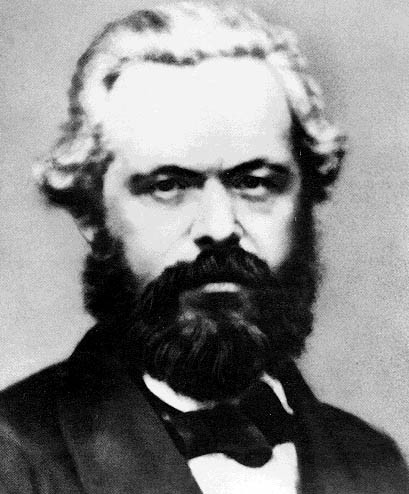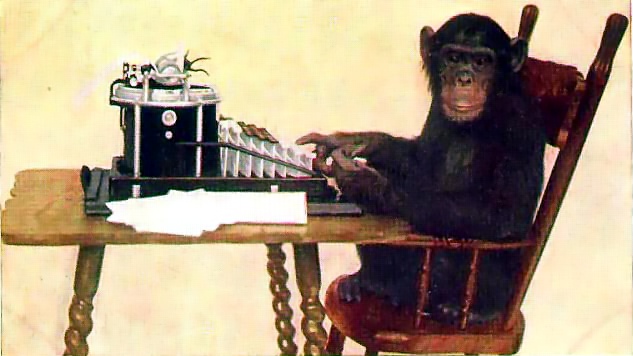 Realism: Socialist Realism (Karl Marx and Friedrich Engels, Leon Trotsky)
Realism: Socialist Realism (Karl Marx and Friedrich Engels, Leon Trotsky)_____
Karl Marx and Friedrich Engels: Social Reality as Class Struggle
The Communist Manifesto as a treatise on aesthetics? Not exactly, but its influence on all aspects of modern thought shouldn't be underestimated, and the Marxist emphasis on the economic causes of all social change translates directly into art as a social product, as Trotsky will show us. And if "The history of all hitherto existing society is the history of class struggles," then class struggles, as defined by Marx and Engels, must have determined the shape of art. Moreover, plenty of non-Marxist artists directed their art and their aesthetic credos against members of Marx's dominant economic class, the bourgeoisie, sharing in the Manifesto's bill of particulars: The bourgeoisie
 |
| Karl Marx in 1861 |
has pitilessly torn asunder the motley feudal ties that bound man to his "natural superiors," and has left no other nexus between man and man than naked self-interest, than callous "cash payment." It has drowned the most heavenly ecstasies of religious fervor, of chivalrous enthusiasms, of philistine sentimentalism, in the icy water of egotistical calculation. It has resolved personal worth into exchange value, and in place of the numberless indefeasible chartered freedoms, has set up that single, unconscionable freedom -- Free Trade. In one word, for exploitation, veiled by religious and political illusions, it has substituted naked, shameless, direct, brutal exploitation.
 |
| Friedrich Engels, c. 1857 |
The bourgeoisie thus has become what some artists claimed to strive to become: like the god of creation. "In a word, it creates a world after its own image."
There is an implicit appeal in the Manifesto for artists to recognize themselves as part of the proletariat, whose work "has lost all individual character, and, consequently, all charm for the workman. He becomes an appendage of the machine, and it is only the most simple, most monotonous, and most easily acquired knack that is required of him." Any artist who depended on wealthy patronage or faced an uncomprehending audience could respond to that. Artists were no strangers to the class struggle.
Karl Marx and Friedrich Engels: The Economic Sources of Consciousness
The German Ideology, written two years before The Communist Manifesto, didn't see print until 1932, but it speaks more directly to some of the issues of intellectual concern to artists. Marx and Engels were working toward defining their particular brand of materialism.
We set out from real, active men, and on the basis of their real life process we demonstrate the development of the ideological reflexes and echoes of this life process. The phantoms formed in the human brain are also, necessarily, sublimates of their material life process, which is empirically verifiable and bound to material premises. Morality, religion, metaphysics, all the rest of ideology and their corresponding forms of consciousness, thus no longer retain the semblance of independence.Men make ideas, ideas don't make men, to greatly oversimplify. Or as Marx and Engels put it, "Life is not determined by consciousness, but consciousness by life." In "civil society," ideas are formed "from material practice," and idealism is "humbug." The "driving force of history, also of religion, of philosophy, and all other types of theory" is revolution. There are no absolutes.
This sum of productive forces, forms of capital, and social forms of intercourse, which every individual and generation finds in existence as something given, is the real basis of what the philosophers have conceived as "substance" and "essence of man," and what they have deified and attacked: a real basis which is not in the least disturbed, in its effect and influence on the development of men, by the fact that these philosophers revolt against it as "self-consciousness" and "the unique."We are, in essence, how we work, but traditional historians have ignored this fact. "For instance, if an epoch imagines itself to be actuated by purely 'political' or 'religious' motives, although 'religion' and 'politics" are only forms of its true motives, the historian accepts this opinion." These historians have made ideas into "the sole determining, active force." In India and Egypt, it was the division of labor that created the caste system, but historians get it backward, believing "that the caste system is the power which has produced this crude social form." The French and English, they suggest, make politics "the driving force of history," while "the Germans move in the realm of 'pure spirit' and make religious illusion" the primary force.
The materialist view of history explains "this theoretical talk from the actual existing conditions." And they find it significant that "For the mass of men, i.e., the proletariat, these theoretical notions do not exist, and hence do not require to be dissolved, and if this mass ever had any theoretical notions, e.g., religion, etc., these have now long been dissolved by circumstances."
Leon Trotsky: The Limitations of Formalism
 |
| Leon Trotsky in 1929 |
"Art for art's sake" is necessarily, in the Marxist point of view, a bourgeois concept. Instead, Trotsky would raise such questions as "to what order of feelings does a given artistic work correspond in all its peculiarities? What are the social conditions of these thoughts and feelings? What place do they occupy in the historic development of a society and a class?" The larger point Trotsky makes is "that of the subsidiary rôle which art plays in the social process."
Trotsky insists that the Marxist concept of art "does not at all mean a desire to dominate art by means of decrees and orders." (One reason, among many, why he didn't get along with Stalin.) And that "It is not true that we regard only that art as new and revolutionary which speaks of the worker, and it is nonsense to say that we demand that the poets should describe inevitably a factory chimney, or the uprising against capital!" But having given an inch, he then takes a mile: "Of course the new art cannot but place the struggle of the proletariat in the center of its attention." He assures us that "Personal lyrics of the very smallest scope have an absolute right to exist within the new art," but he always has the function of the personal lyric as the end in sight: "the new man cannot be formed without a new lyric poetry." And his assurance that "No one is going to prescribe themes to the poet or intends to prescribe them" sounds a little hollow in hindsight.
Turning his attention to the Formalists, Trotsky faults it for its pretense at objectivity, and even suggests an analogy to the "infinite monkey theorem" -- that a monkey hitting typewriter keys at random would eventually, given infinity in which to do so, type the plays of Shakespeare.
If one is to regard the process of poetic creation only as a combination of sounds or words, and to seek along these lines the solution of all the problems of poetry, then the only perfect formula of "poetics" will be this: Arm yourself with a dictionary and create by means of algebraic combinations and permutations of words, all the poetic works of the world which have been created and which have not yet been created.... All that one needs is infinity in time, called eternity.Clearly an impossibility, Trotsky says, so "the fundamental source of poetic words will remain, as before, the preconceived artistic idea understood in the broadest sense, as an accurate thought and as a clearly expressed personal or social feeling and as a vague mood."
 |
| Victor Shklovsky in the 1920s |
Trotsky admits "that the need for art is not created by economic conditions. But neither is the need for food created by economics. On the contrary, the need for food and warmth creates economics." Marxism itself can't be used to judge the success of a work of art. "But Marxism alone can explain why and how a given tendency in art has originated in a given period of history; in other words, who it was who made a demand for such an artistic form and not for another, and why." Art, in short, is "a function of social man indissolubly tied to his life and environment."
To those who insist on the autonomy or the timelessness of art, Trotsky has nothing but scorn: "The effort to set art free from life, to declare it a craft self-sufficient unto itself, devitalizes and kills art. The very need of such an operation is an unmistakable symptom of intellectual decline." All art, like politics, religion, law and ethics, is a function of the social environment. The Formalists, Trotsky charges "show a fast ripening religiousness. They are followers of St. John. They believe that 'In the beginning was the Word.' But we believe that in the beginning was the deed. The word followed, as its phonetic shadow." As for Symbolism, it was "the intelligentsia's escape from reality, its way of constructing another world, its artistic bringing up in self-sufficient day-dreaming, contemplation and passivity."
Trotsky is certain that "the new art will be realistic.... Our age cannot have a shy and portable mysticism.... Our age wields an axe." (A chilling prophesy of the instrument used in Trotsky's murder.)

No comments:
Post a Comment